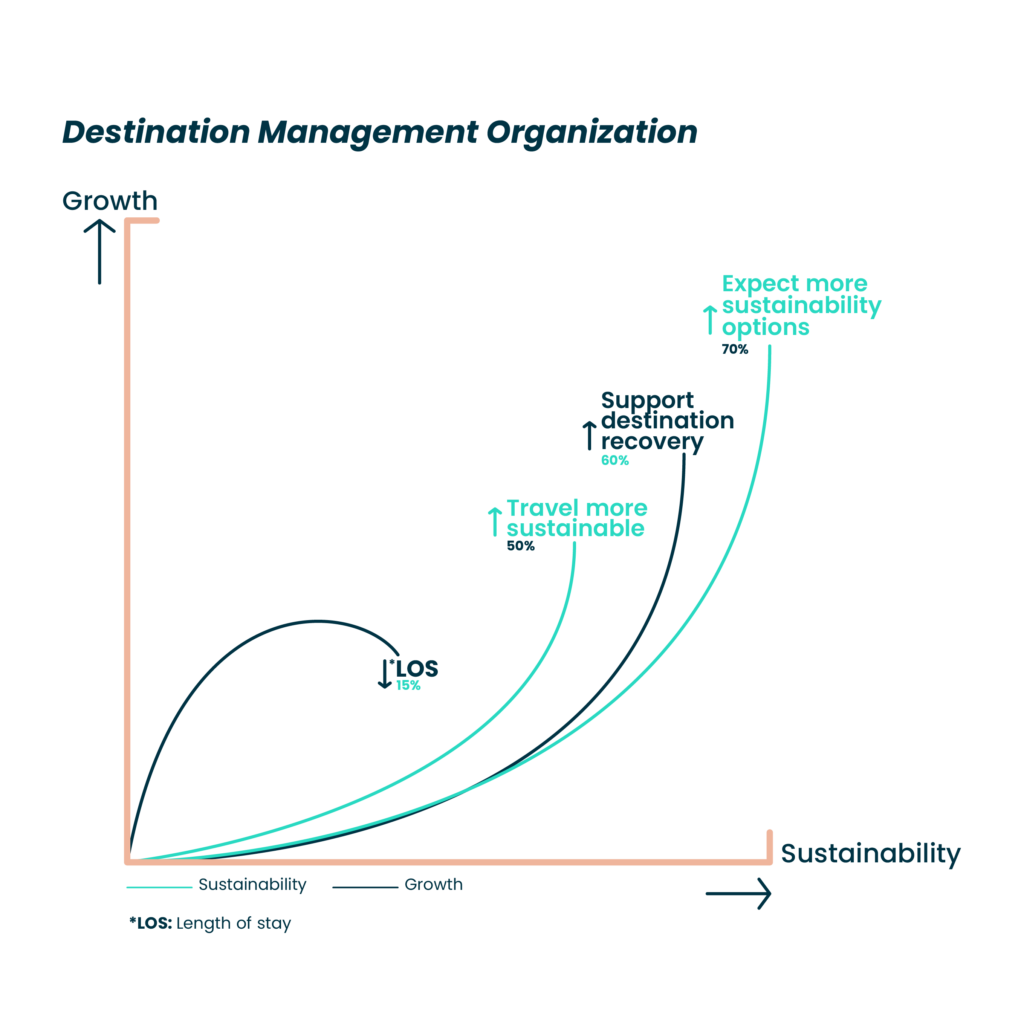What is Destination Management and Why is it Important

- What is destination management?
- Stats about destination management
- What is the importance of destination management?
- What is the difference between destination marketing and destination management?
- What is the function of a destination management company?
- Best practices in destination management
- Real-life examples of destination management that used best practices
- Conclusion
Destination management plays a vital role in helping organizations in the travel and tourism industry achieve their goals. It can unlock many benefits, such as delighting the travelers so they return to the destination, increasing revenue, and building a sustainable plan for the future.
However, the term destination management still escapes many people. Given how important it is, we wanted to help you understand the definition of destination management. We even went one step further and refined a list of the most important stats, best practices, and real-life case studies.
What is destination management?
Before we define destination management, we have to define a destination. A destination can be anything, including a country, region, province, district, city, park, museum, neighborhood, etc. Destination management is a comprehensive process that includes the management of different aspects of the destination.
Destination management can include anything of the following:
- Local resources
- Accommodation
- Amenities
- Events & activities
- Environmental concerns
- Marketing efforts
- Transportation
- Tourist attractions
Destination management can also include local businesses and leverage local knowledge to help create immersive experiences and attract even more travelers to visit the destination. Every destination management system (DMS) is unique. Some may focus on local resources and accommodation, while others can focus on tourist attractions, events, and activities.

Stats about destination management
The most important stat for assessing the success of a destination management strategy is the length of stay or LOS. LOS is a parameter that shows you the ratio of the number of guests and the number of total arrivals. A recent study assessed and compared LOS across 32 destinations worldwide, including well-developed destinations and those in emerging economies.
The global trend of LOS is falling by almost 15%. There is one exemption, though – the LOS of individual destination countries is increasing.
Next, we have the noteworthy change in how destination management organizations (DMO) approach destination management. Over 50% of these organizations will enlarge their scope. They are no longer only focused on brand promotion and traditional marketing – DMOs are shifting toward enhancing the sustainability of destinations and their overall competitiveness.
It goes in line with the fact that over 50% of global travelers want to travel more sustainably, and almost 70% expect to see more sustainable tourism options the travel industry offers. Furthermore, over 60% of travelers want to contribute to supporting the destination’s recovery efforts.
What is the importance of destination management?
Destination management is vital for several reasons as it benefits the entire area defined as a ‘destination’. Many people only see the benefit of tourists bringing more money to the destination. However, this is only one side-benefit of a well-planned and executed destination management strategy.
Destination management can help attract sponsors and investors. This financial injection can help local businesses to grow and thrive. Thanks to this cash, the villages and towns in the area can be revitalized. The surplus of money can help revitalize the economy of an entire region or even an entire country.
Since destination management adds value to a destination, we are talking about a long-term effect. It simply means the destination and country it’s in will continue to reap these benefits in the foreseeable future.
What is the difference between destination marketing and destination management?
Destination marketing and destination management can not be used interchangeably as these are two completely different things. As previously stated, destination management refers to managing different elements found in one destination. On the most basic level, these elements include physical locations, people, products, and services.
However, when you combine these elements, you have the attractions, transportation, accommodation, and hospitality of a destination. The role of destination management is to manage these elements and ensure sustainability and consistency in the travel experience.
Destination marketing is one of the most important elements of destination management too. In other words, destination management has to encompass destination marketing as a strategy. Destination marketing aims to inform potential visitors about the destination by focusing on communicating its values. Ultimately, it has to be able to persuade travelers to visit it.
What is the function of a destination management company?
Before you work with a DMC, you need to know what it is. The best way to understand the function of a destination management company (DMC) is to know what this management organization stands for.
Gain a richer perspective on the pivotal roles and advantages of Destination Management Companies in the tourism sector. This article delves into the operational nuances of these companies, shedding light on their integral part in shaping travel experiences.
DMC is a for-profit tourism business that can offer various services to groups and individual travelers. These services range from meeting your travel and accommodation needs to meeting your entertainment and leisure interests.
DMCs have extensive knowledge of the destination and resources and are well connected with local businesses. It enables these organizations to coordinate and implement anything found on their travel options and itineraries. Not all DMCs are the same, which makes their specific functions vary.
For instance, a DMC can specialize in program design and logistics management but offer no supplier management and accounting services. Other DMCs can have all these services included in their offer.
Best practices in destination management
Destination management encompasses many unique destination aspects, making it hard to distinguish good from bad practices. Here are the noteworthy best practices in destination management that touch on different aspects of destinations.
Moving away from one-size-fits-all
Many DMCs have a one-size-fits-all approach to communicating the value of a destination. However, the recent COVID-19 pandemic proved that it might not be the best approach. Diversifying the marketing mix and adding personalized messages to attract both local and international travelers is a better solution.
While it may increase the research and marketing costs, this tactic can offer better results in the long run. It enables DMCs to identify destination aspects that cater to the needs of travelers in the local and international tourism markets. It can help the destination thrive, even if unforeseen circumstances occur.
Development of the infrastructure
The destination’s infrastructure is key to attracting new tourists and accommodating the increasing number of tourists visiting the destination. Given the scale of work that has to be planned, managed, and completed, this practice involves the authorities in the destination. The local governments and councils must be swift to recognize the need of travelers.
To do it, they need to work with tour operators and travel agents. They must quickly follow with required infrastructure upgrades or developments, which often involves issuing relevant permits, funding the projects, and overseeing their development.
Smart visitor dispersal
The famous 5-places-to-visit and 10-things-you-must-do travel blogs have the tourists always visiting the same locations in the destination. However, this practice hinders the development of the destination as a whole. That’s simply because tourists always end up dining at the same restaurants and staying at the same hotels.
The best way to facilitate the development of the entire destination and drive its economic growth is to disperse visitors across the destination. At the same time, this practice can improve traveler satisfaction rates as they get to explore new and less-famous locations while still having access to the most famous sights.
Custom-tailored tourism destination marketing
We’ve already established that destination marketing is one of the key aspects of destination management. In the era where travelers look for personalized experiences, traditional marketing has very few things to offer.
That’s why DMCs started custom-tailored tourism destination marketing campaigns. They use a variety of channels to reach out to potential visitors. However, instead of delivering a uniform message, they communicate the unique destinations’ values to attract people with specific needs and expectations.
Travel responsibly
The increasing number of tourists in one destination can disrupt the everyday life of the locals, affect the region’s sustainability, and even result in an increased number of traffic accidents. That’s where the next best destination management practice, ‘travel responsibly’, comes into play.
Responsible travel can encompass various initiatives, including educating visitors about the local’s way of life, ensuring safety on the roads, enhancing public transport capacity, and building new parking spaces. The goal is to minimize the disruptions tourists can create while improving the safety of visitors and the locals.
Real-life examples of destination management that used best practices
A best practice in destination management is just a tip. To see the value of the best practice, you need to see it used in real-life.
Hotels in La Cerdanya focus on the local tourism market
La Cerdanya is one of the most attractive areas that international travelers like to visit while exploring Spain. However, the number of guests significantly decreased due to the travel restrictions. The hotels in the region recognized the current one-size-fits-all destination planning and management is no longer viable.
Catering to the needs of people in the local tourism market enabled the hotels in this Spanish region to attract more guests from Spain, keep their doors open, and even increase revenue.
Croatian cities accommodating to the cruising industry
The international cruise industry is one of the fastest developing sub-sectors of the travel industry. As a country with a beautiful coastline, it has a limited number of ports to accommodate cruises. The particular need for this type of accommodation exploded after some Croatian cities were featured in famous movies and TV shows.
In collaboration with DMCs, cruise companies, and tour operators, Croatia identified the key ports that need to be upgraded to accommodate cruisers. As a result, cruising tourism in Croatia exploded, generating more than 400% of revenue compared to previous seasons.
Copenhagen visitor dispersal program
Wonderful Copenhagen, the Danish capital region’s official tourism organization, recognized the visitor dispersal needs and benefits it can offer both local and international visitors. The study found that 80% of locals want more dispersal of visitors, and travelers are more satisfied when they visit five or more neighborhoods.
Wonderful Copenhagen took action in collaboration with the local authorities. The new framework is named 10xCopenhagen. Over 50% of the new hotels in Copenhagen are being built in surrounding neighborhoods. It will help promote sustainable tourism and improve the visitors’ overall experience and satisfaction rates.
The ICS travel inspiration magazine
The ICS is one of the world’s leading DMCs. While the company still relies on traditional marketing to achieve some of its goals, it has also launched a more custom-tailored campaign. The company found a sweet spot for its campaign not to be too aggressive.
The ICS launched an online magazine with the sole purpose of helping travelers look for travel inspiration. They named the magazine The ICS Odyssey. Every new edition features a new destination highlighting a unique experience it can offer.
Destination Queenstown’s responsible travel initiative
When it comes to alpine destinations available on our planet, few can compare to Queenstown, New Zealand. Recently, this destination has become very popular among international travelers. Many people even decided to invest in the region, buying land and building their new homes.
However, Destination Queenstown, a regional travel organization in charge of Queenstown, discovered that residents are troubled with several concerns ranging from over-tourism to sustainability.
The organization reacted with many destination management initiatives to make the stay and travel in Queenstown more responsible. They invested in roads, public transport, and parking, but most importantly, they also introduced a visitor care code to enhance and promote travel responsibility.
Conclusion
While tourism can be one of the factors that help a destination or entire area to thrive, it has to be well-planned. Destination management is the only holistic approach to delivering this to a destination. As a coordinated process, it helps manage all the key elements that make a destination.
Now that you know what destination management is, the best practices, and real-life examples, you can better understand this concept and see the value destination management creates for the destination and tourists, DMCs, and travel agents.
Subscribe to
our newsletter
Yay! You are now
subscribed to our
newsletter
Mize is the leading hotel booking optimization solution in the world. With over 170 partners using our fintech products, Mize creates new extra profit for the hotel booking industry using its fully automated proprietary technology and has generated hundreds of millions of dollars in revenue across its suite of products for its partners. Mize was founded in 2016 with its headquarters in Tel Aviv and offices worldwide.
Related Posts

30 Most Important Travel Industry Events for 2024
30 min. Social share: 2024 is packed with must-attend travel industry events. Stop by to discover all relevant events conveniently grouped by continents with listed dates, themes, and locations! Many travel industry experts believe that travel industry events play a pivotal role in shaping the future of the travel industry. Why is this so? It’s […]

Empowering Equality: Mize Leads the Way in Travel Technology
7 min. Are we all equal? Are we all equally represented in the business world? In some professional sectors, there might still be some under-representation of women, minorities, and the LGBTQIA+ community. The tech sphere is no different, but is the travel tech sector a spark of hope? As the business world becomes more diverse, […]

Slow Tourism Case Studies: Examples to Truly Understand Slow Tourism
14 min. The tourism industry is moving at an ever-accelerating pace. That’s because the tourism industry is perhaps one of the verticals that depend on the most factors. One of the main factors that affect it is social movements, given that tourism brands of all sizes always cater to the needs of consumers. One of […]